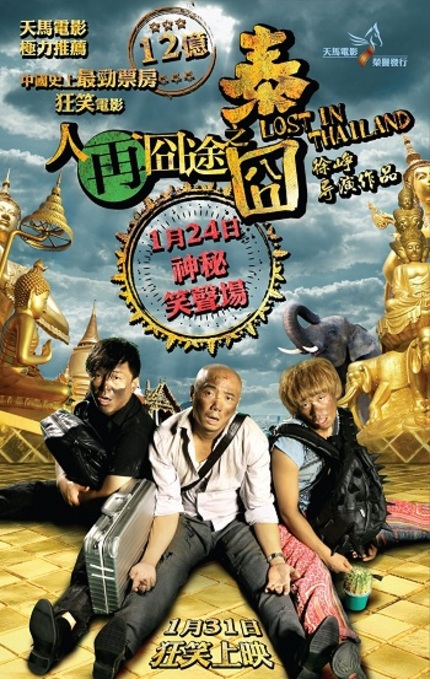Review: LOST IN THAILAND Worked at Home but Doesn't Travel Well

Comic actor Xu Zheng's directorial debut broke a slew of box office records to become the most successful Chinese language film of all-time on home soil. But despite slick production values and a strong cast, Lost in Thailand is a private joke, funny only to a 1.3 billion-strong home crowd.
Xu Zheng made a name for himself as part of director Ning Hao's comedy ensemble, appearing in the smash hit caper movies Crazy Stone (2006) and Crazy Racer (2009), as well as Ning's still unreleased Western Sunshine (aka No Man's Land). Last year, Xu appeared in Pang Ho Cheung's Hong Kong hit Love in the Buff as Miriam Yeung's rich new boyfriend, but all of that is now firmly in his past, and he is likely to be known from now on as the writer-producer, director, and star of super-hit Lost in Thailand, which beat out stiff competition from Jackie Chan's CZ12 (aka Chinese Odyssey) to rule supreme at the Chinese box office over the holiday period.
The plot centres on two rival scientists from the same Beijing firm, Xu Lang (Xu) and Gao Bo (another Ning Hao favourite, Huang Bo), in a race against time to track down their boss, honeymooning in Northern Thailand. Xu has invented a new superfuel that is set to make him, or whoever secures Chairman Zhou's power of attorney first, a billionaire. So despite juggling a divorce and custody battle with his estranged wife, off he goes to Chiang Mai, with Gao on his tail. But, no sooner has he stepped aboard the plane, then things start going wrong. He loses the map to Zhou's whereabouts, breaks his phone and misplaces his passport, and in the spirit of slapstick capers of old, has no alternative but to team up with eccentric simpleton tourist BaoBao (Bao Quangqiang), a pancake chef with a sightseeing bucket list to complete, and a lucky cactus.
While moments of Lost in Thailand are funny, the film's biggest problem is a script plucked from the 1980s, almost entirely built around coincidence, cliché and contrivance. Our three lead characters are also so wholly archetypal and devoid of originality that you can see every twist and turn of the story signposted from the opening moments. Xu is the serious, highly-strung, yet noble hero, who needs to spend more time with his family and do what's right with the limitless wealth he is on the verge of acquiring. Gao, meanwhile, is uptight, jealous and vengeful, always scheming ways to one-up his better-looking colleague, and while not adverse to moments of cartoon villainy, is only a life lesson or two away from becoming a decent guy. Baobao, conversely, is the simple-minded, wholesome mamma's boy from the countryside, whose deluded babblings veil an earnestness and wisdom from which everyone can benefit, if only he can get to grips with the fast pace of the modern world.
While the script (for which Xu is credited alongside two other writers) is shallow, predictable and trite, Xu's skills as a director are more successful. The film whips along at a brisk pace, captures the exotic locations well without resorting too much to travelogue money shots, and boasts some imaginative, eye-catching editing. It maintains a high energy level throughout, helped greatly by the extroverted performances of Xu's two co-stars, Huang and Bao, while taking the quiet, straight man role for himself.
Beyond that, there's little more to Lost in Thailand, which explains to some degree the film's success. It is so broad, inoffensive and accessible that it's easy to see how it has been embraced by so many people and taken so much money. That said, it is unlikely to perform the same feat elsewhere, as it lacks a creative or imaginative hook to convince non-Chinese audiences to overcome their fear of subtitles - a particularly high hurdle to overcome for comedies.
Lost in Thailand makes an exciting case for Chinese film financiers to not shy away from contemporary themes and break away from martial arts dramas and period epics. Clearly, local audiences are ready for something more relevant. That said, if China ever wants to become more than another Bollywood, and make films that really do rival Hollywood in their universal appeal, they need to try a little harder than this.
Lost in Thailand
Director(s)
- Zheng Xu
Writer(s)
- Ding Ding
- Huan Shu
- Zheng Xu
Cast
- Zheng Xu
- Baoqiang Wang
- Bo Huang
- Hong Tao







